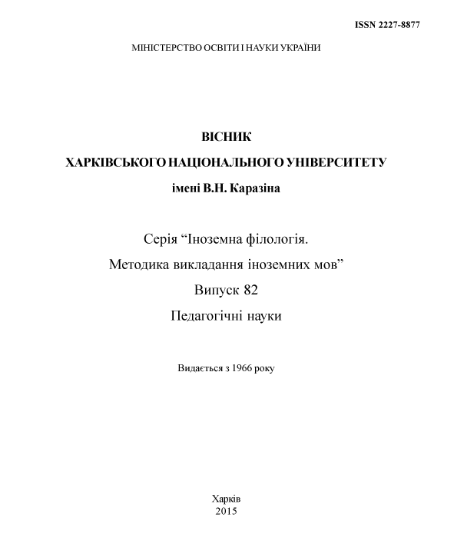Психолінгвістичні та психологічні основи розробки методики навчання усного перекладу з аркуша
Анотація
В статті проаналізовано загальнопсихологічні механізми діяльності (сприйняття, пам’ять, осмислення); специфічні механізми діяльності (увага, вірогіднісне прогнозування мовлення тощо); специфічні механізми перекладу (переключення, перекодування тощо). Визначено, що процес усного перекладу з аркуша (УПА) складається з трьох основних фаз: сприйняття ТО, прийняття перекладацького рішення і оформлення ТП. Розглянуто навички і вміння притаманні кожній фазі процесу УПА. До першої фазу процесу УПА, віднесено навички і вміння девербалізації, володіння широким полем зору під час читання ТО і вірогідніс-ного прогнозування під час смислового аналізу ТО; до другої – навички і вміння переключення та навички і вміння застосування перекладацьких трансформацій; третя фаза включає навички і вміння синхронізації операцій.
Завантаження
Посилання
2. Беляев Б.В. Психологический анализ процесса языкового перевода/Б.В. Беляев //Журнал «Иностранные языки в школе». — М., 1964 — Вып, 11. — C. 160—173.
3. Бернштейн Н.А. Физиология движений и активность / Н.А. Бернштейн. – М. : Наука, 1990. – 496 с.
4. Eйгер Г.В. Некоторые психолингвистические аспекты процесса перевода научно-технической литературы (взаимодействие фоновых и языковых знаний переводчика) / Г.В. Ейгер, В.Л. Юхт // Тетради переводчика. — М. : "МО", 1987. — Вып. 22. — С. 87—94.
5. Ермолович В.И. Проблемы изучения психологических аспектов перевода / В.И. Ермолович // Тетради переводчика. Науч.-теор. сб. — М., 1999. — Вып. 24. — С. 45—62.
6. Жинкин Н.И. Речь как проводник информации / Н.И. Жинкин - М. Наука, 1982 - 160 с.
7. Зимняя И.А. Психологический анализ перевода как вида речевой деятельности// И.А. Зимняя //Вопросы теории перевода. Сборник научных трудов ГЙИЯ им. Мориса Тореза. — М. : “МО“, 1978. — No 127. — С. 37—50.
8. Клычникова З.И. Психологические основы обучения чтению на иностранном языке / З.И. Клычникова. — М.: Просвещение, 1983. — 207 с.
9. Миньяр-Белоручев Р.К. Как стать переводчиком? / РК. Миньяр-Белоручев. — М.: Готика, 1999. — 176 с.
10. Рубинштейн С.Л. Проблемы общей психологии/ С.Л. Рубинштейн. — М. : Педагогика, 1973. — 424 с. 11. Чернов ГВ. Теория и практика синхронного перевода / Г.В. Чернов. — М.: Международные отношеHH51, 1987. — 208 c.
12. Ferreira A. Psycholinguistic and Cognitive Inquiries into Translation and Interpreting / A. Ferreira, J.W. Schwieter. — Philadelphia : John Benjamins Publishing Company, 2015. – 213 p.
13. Hassan B.A. Translation as a Mental Activity: from Psycholinguistics to Neurolinguistics / B.A. Hassan // International Journal of Cognitive Linguistics. – NewYork : Nova Science Publishers, 2013. — Vol. 4 — Issue 1. – P. 55–64.
14. Miller G. A. The organization of lexical memory: Are word associations sufficient? / G.A. Miller //The Pathology of Memory. — New-York : Academic Press, 1969. – P. 223–236.
REFERENCES
Bassue Vebb, L.K. (1991). Obuchenie perevodu s lista kak professionalno i deyatelnosti (na materiale ispanskogo yazyka). Avtoref, kand.ped nauk. [Sight translation training as professional activity. Cand. ped. sci. diss]. Moscow. 22 p. (in Russian)
Belyaev, B.V. (1964). Psihologicheskij analiz protsessa yazykovogo perevoda [Psychological analysis of language translation process]. Inostyrannye yazyki y schkole — Foreign languages at school. 11, 160-173 (in Russian)
Bernschtein, N.A. (1990). Fiziologiya dvizhenij i aktivnost [Physiology of movements and activity]. Moscow: Nauka Publ. Chernov, G.V. (1987).
Teoriya i praktika sinchronnogo perevoda [Theory and practice of simultaneous translation]. Moscow: Mezhnunar. Otnoschen. Publ.
Ejger, G.V. and Yuht, V.L. (1987). Nekotorye psiholingvisticheskie aspekty protsessa perevoda nauchno-technicheskoj literatury (vzaimodejstvie fonovych i yazykovych znanij perevodchika) [Some psycholinguistic aspects of Scientific literature process translation (interaction background and language knowledge of translator]. Tetradi perevodchika – Copybooks of translator. 2, 87-94 (in Russian)
Ermolovich, V.I. (1999). Problemy izucheniya psihologicheskih aspektov perevoda [Problems of studying of psychological aspects of translation]. Tetradi perevodchika – Copybooks of translator, 24, 45-62.
Ferreira, A. and Schwieter John W. (2015) Psycholinguistic and Cognitive Inquiries into Translation and Interpreting. Philadelphia : John Benjamins Publishing Company.
Hassan, B.A. (2013) Translation as a Mental Activity: from Psycholinguistics to Neurolinguistics. International Journal of Cognitive Linguistics, 4 (1), 55-64.
Klychnikova Z.I. (1983). Psihologicheskie osnovy obucheniya chteniyu na inostrannom yazyke |Psychological bases of reading training in foreign language]. Moscow: Prosvecshenie Publ.
Miller, G.A. (1969). The organization of lexical memory: Are word associations sufficient? In G.A. Talland & N.C. Waugh (Eds.). The Pathology of Memory. NewYork : Academic Press, pp. 167-173
Minyar-Beloruchev, R.K. (1999). Kak stat perevodchikom? [How to become a translator]. Moscow: Gotika Publ.
Rubinschtein, S.L. (1973). Problemy obschej psihologii [Problems of general psychology]. Moscow: Pedagogika Publ.
Zhynkin, N.I. (1982). Rech kak provodnik informatsii [Speech as information carrier]. Moscow: Nauka Publ.
Zimnyja, I.A.(1987) Psihologicheskij analiz perevoda kak vida rechevoj dejatelnosti [Psychological analysis of translation as a kind of speech activity]. Voprosy teorii perevoda – Questions of theory of translation, 127, 37-50.




